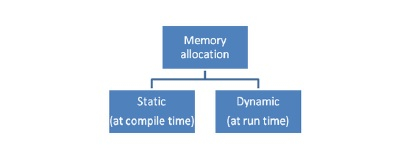
 Data Structure
Data Structure Networking
Networking RDBMS
RDBMS Operating System
Operating System Java
Java MS Excel
MS Excel iOS
iOS HTML
HTML CSS
CSS Android
Android Python
Python C Programming
C Programming C++
C++ C#
C# MongoDB
MongoDB MySQL
MySQL Javascript
Javascript PHP
PHP
- Selected Reading
- UPSC IAS Exams Notes
- Developer's Best Practices
- Questions and Answers
- Effective Resume Writing
- HR Interview Questions
- Computer Glossary
- Who is Who
What do you mean by static memory allocation in C programming?
Memory can be allocated in the following two ways −

Static Memory Allocation
Static variable defines in one block of allocated space, of a fixed size. Once it is allocated, it can never be freed.
Memory is allocated for the declared variable in the program.
The address can be obtained by using ‘&’ operator and can be assigned to a pointer.
The memory is allocated during compile time.
It uses stack for maintaining the static allocation of memory.
In this allocation, once the memory is allocated, the memory size cannot change.
It is less efficient.
The final size of a variable is decided before running the program, it will be called as static memory allocation. It is also called compile-time memory allocation.
We can't change the size of a variable which is allocated at compile-time.
Example 1
Static memory allocation is generally used for an array. Let’s take an example program on arrays −
#include<stdio.h> main (){ int a[5] = {10,20,30,40,50}; int i; printf (“Elements of the array are”); for ( i=0; i<5; i++) printf (“%d, a[i]); } Output
Elements of the array are 1020304050
Example 2
Let’s consider another example to calculate sum and product of all elements in an array −
#include<stdio.h> void main(){ //Declaring the array - run time// int array[5]={10,20,30,40,50}; int i,sum=0,product=1; //Reading elements into the array// //For loop// for(i=0;i<5;i++){ //Calculating sum and product, printing output// sum=sum+array[i]; product=product*array[i]; } //Displaying sum and product// printf("Sum of elements in the array is : %d
",sum); printf("Product of elements in the array is : %d
",product); } Output
Sum of elements in the array is : 150 Product of elements in the array is : 12000000

